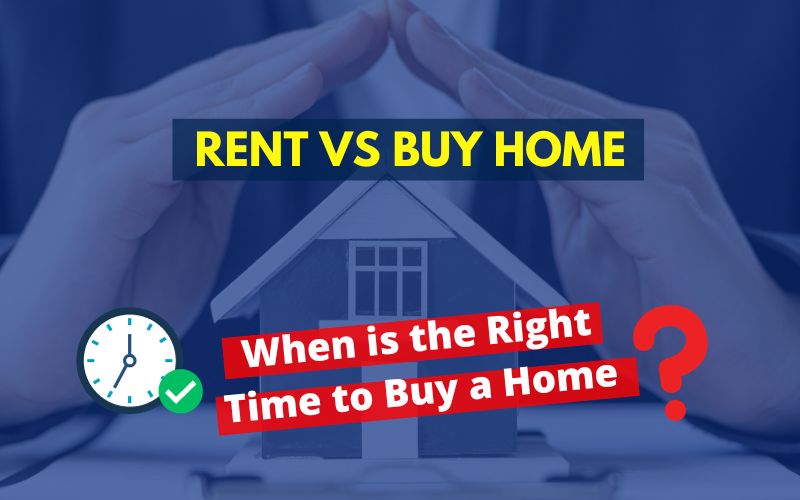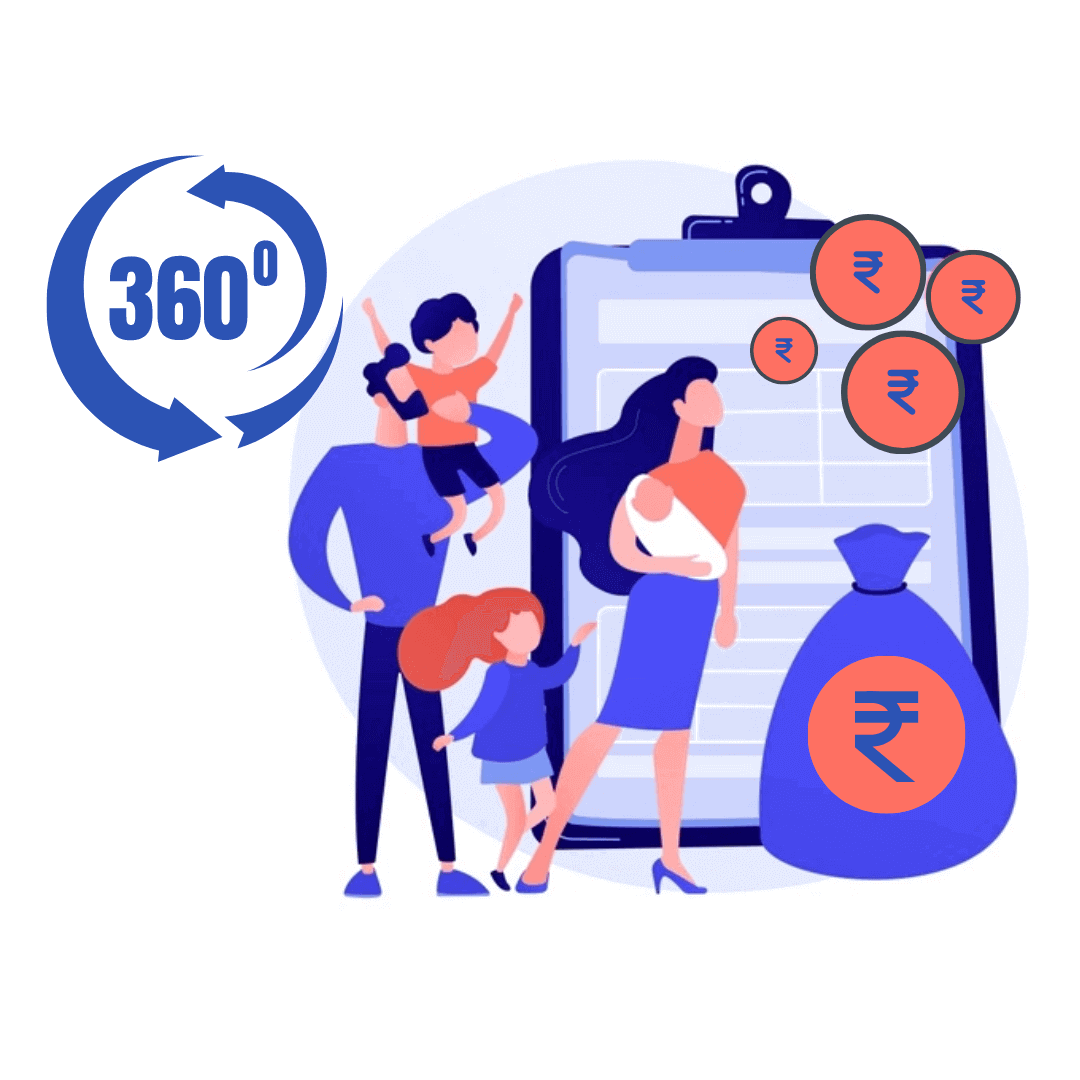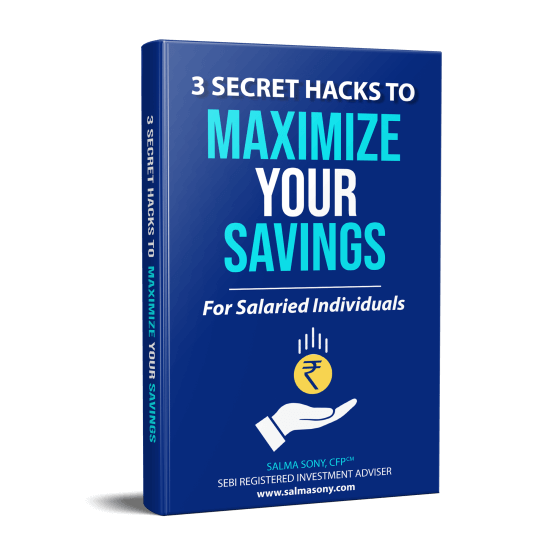It may seem impossible to take a home without a loan, but it’s not that difficult. A mindset and proper planning with disciplined investing can make it possible. Let’s explore a simple strategy on how to buy a home without a loan.

Table of Contents
Evaluate Your Financial Situation
Evaluating your financial situation is necessary before you plan your big purchases, like buying a home; this will help you understand your spending habits, what portion of your earnings goes towards paying debt, how well you are prepared to handle any emergency, and whether you can afford a home purchase now.
✔️Spending Habits
Most of the time, individuals include certain spending habits unconsciously and don’t analyze them.
One common problem I encounter while working with couples is their mobile bills. They spend not less than Rs. 1,200 per month (Rs. 600 per person) because they never bother understanding their budget and continue to be in a post-paid connection. In contrast, the same can be reduced to a significant extent just by shifting to the pre-paid connection, which may not cost you Rs. 550 per quarter, i.e., 185 per month. Sure, shot savings of Rs. 415 that come to approx. Rs. 5,000 per annum (Rs. 10,000 for a couple).
Imagine investing Rs. 830 per month at 8% (moderate ROI); it can help you save Rs. 1.5 lakhs in the next 10 years. Like this, small savings can help you save lakhs by analyzing your spending habits and taking action.
“Beware of little expenses. A small leak will sink a great ship.” – Benjamin Franklin.
✔️Debt Management
You should not have a high-interest loan at any moment, and your EMI should not exceed more than 35% of your take home. If it does, you are in a danger zone and must fix this immediately.
With the ease of personal loans, credit cards, and attractive offers available, you may tend to make unplanned purchases and let you get into a debt trap by choosing the Smart EMI option.
Remember: Smart EMI is a smart strategy by the bank that works for them, not for you. Hence, stay away.
More Read: How to Reduce Loan Burden Smartly: 5 Steps Strategy
✔️Emergency Funds
Ensure you have planned for an emergency minimum of 3-6 months of your salary and a business professional minimum 1-year expenses; this will help you handle any emergency.
After analyzing these above-mentioned three points, if you lack fulfilling anyone, you must fix them first and only plan for the house purchase goal.
Plan Your House Purchase Goal
Being aware that you have to buy a home is not enough. Just being aware and buying it are two different things. House purchase planning includes:
🟢Research on Cost Involved
Buying a home is not limited to the purchase cost but includes two other significant expenses.
a) Registration cost and stamp duty
Registration Cost: When you buy a home, it must be registered with the government. The registration fee is known as the registration cost. It is typically a set percentage of the property’s value and varies by state.
Stamp Duty: Stamp duty is a tax the government imposes on purchasing immovable property, such as land, buildings, or houses. It’s a state-level tax and varies from state to state in India. When you buy a home or any property, you must pay stamp duty to the state government.
| Metropolitan City | Stamp Duty | Registration Charges (Male) | Registration Charges (Female) |
| Ahmedabad | 4.9% | 1% | Zero |
| Bangalore | 2% – 5% | 1% | 1% |
| Chennai | 7% | 4% | 4% |
| Delhi | 4% – 6% | 1% | 1% |
| Hyderabad | 4% | 0.5% | 0.5% |
| Kolkata | 5% – 7% | 1% | 1% |
| Mumbai | 3% – 6% | 1% | 1% |
| Pune | 5% | 7% | 6% |
| Surat | 4.9% | 1% | Zero |
Source: Magicbricks / Bankbazar
b) Home Interior
When you buy a home, it is generally not ready for move-in. You need to get the essential work done, such as installing a modular kitchen and wardrobe in the rooms and some essential work in the bathroom; this costs a reasonable amount, depending upon the kind of work you are willing to get done.
Hence, when planning to purchase a house, ensure you have prepared for these expenses, too. Most couples take top-up home loans when they fail to consider these expenses.
🟢Set a Realistic Timeline
When buying a home, most individuals, specifically women (I understand this feeling), are keen to have their dream home as soon as possible as it gives them a sense of security. Setting a realistic timeline is one of the most essential components of house purchase planning as it is among big purchases.
You don’t have to own a house early in your career just because people ask or your friend has bought it or for tax savings. Keeping a house purchase goal as a medium to long-term goal with self-funding is the best way to live a financially peaceful life.
I have seen many couples start early with loan funding – buying 1 Bhk, then selling that and buying 2 Bhk, and then the final home 3 Bhk. In this process, you lose lots of money in registration and stamp duty and pay lots of money to the bank as interest on the loan.
Instead, set a realistic timeline. Pay rent instead of paying interest to the bank on the home loan, which will be much less. And, you can own a self-funded home almost one-third of the time when you compare it with a loan-funded one (we will explore this with calculations to help you understand how?).
🟢Have an Open Mindset to Fit Your Budget
Be open-minded while doing your home purchase research. Don’t be adamant about buying a home early. You can still live a comfortable life and have much more financial stability by staying on rent and planning to buy only when you know this home will be your dream home. No confusion.
More Read: Rent Vs Buy Home: When Is The Right Time To Buy A Home?
How to Buy a Home Without a Loan – Replace EMIs to SIPs
Mutual fund SIPs are one of the best ways to start saving small for bigger goals. If you are comfortable with EMIs, you must make yourself comfortable with SIPs to make investing work in your favor.
If you can commit Rs. 50,000 for home EMI, you must commit Rs. 50,000 for SIP for the house purchase goal instead.
➡️Consider you need funding of Rs. 62 lakhs today and can commit Rs. 50,000 only.
| Home Value Today | Rs. 62,00,000 |
| Inflation | 6% |
| Home Value After 10 Years | Rs. 1.11 Crores |
➡️If you go for a loan, then your cost of funding of Rs. 62 lakhs will be Rs. 1.17 Crores.
| Loan Amount | Rs. 62,00,000 |
| Loan Interest | 9% |
| Loan Term | 30 Years |
| Loan EMI | Rs. 50,000 (Approx.) |
| Interest paid to the bank | Rs. 1.17 Crores |
➡️If you commit a monthly SIP of Rs. 50,000 at 8% (to be moderate) for 12 years, you can accumulate Rs. 1.21 Crores. Indeed, you can fund the entire house purchase by yourself and own it in just 12 years.
| SIP Amount | Rs. 62,00,000 |
| SIP ROI | 8% |
| SIP Term | 12 Years |
| Accumulation | Rs. 1.21 Crore |
Even with tax benefits on home loans, loan funding cannot match the self-funding. I hope you understand why I insist on working on a mindset shift of replacing EMIs with SIPs.
With this, you must be clear on how to buy a home without a loan.
Conclusion
Loan funding is just a mindset. With financial planning and a mindset shift, big purchases like homes, cars, etc, can be entirely self-funded. It’s time to break the loan funding chain and start implementing the shared strategy on buying a home without a home loan for self-funding and peace of mind.






